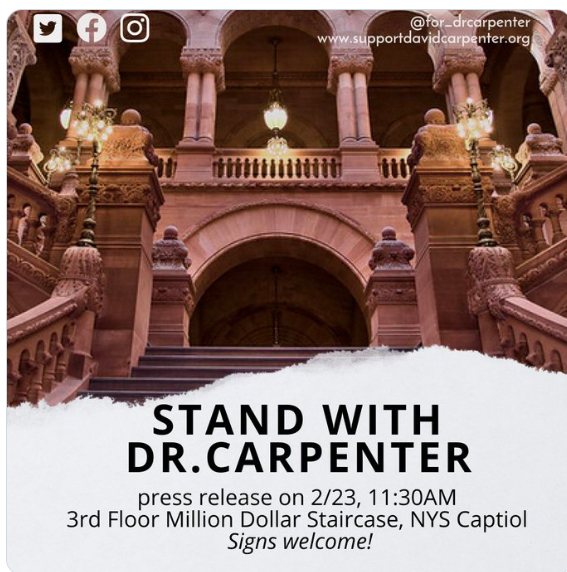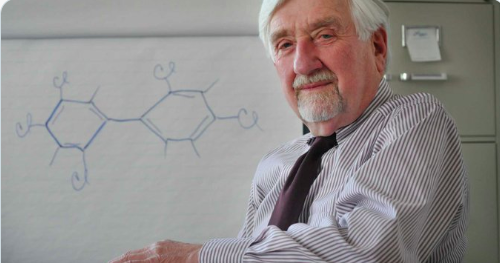The University at Albany in New York State has closed its investigation of Professor David Carpenter, the director of its Institute for Health and the Environment, without taking any disciplinary action.
After being barred from going to his office most of last year, Carpenter may now once again “teach and conduct research on campus,” according to a statement released by the University on Tuesday evening.
The full text of the statement is below:
 On Wednesday, Carpenter issued his own statement, in which he said that he is “very proud of [his] work with plaintiffs around the country who seek to hold Monsanto responsible for the damage done by its products.” He added that he is “humbled and deeply appreciative of the thousands of people who heard about my situation and supported me.” (Full text, below.)
On Wednesday, Carpenter issued his own statement, in which he said that he is “very proud of [his] work with plaintiffs around the country who seek to hold Monsanto responsible for the damage done by its products.” He added that he is “humbled and deeply appreciative of the thousands of people who heard about my situation and supported me.” (Full text, below.)

Carpenter Placed on “Alternate Assignment”
Just over two weeks ago, on February 5, the Albany Times Union reported that Carpenter had been “quietly placed on alternate assignment” as the University conducted a “disciplinary investigation” of his work as an expert witness on the health effects of PCBs, a family of highly toxic chemicals, formally known as polychlorinated biphenyls. They were manufactured by Monsanto until they were banned by the EPA in the late 1970s. (More about PCBs here.)
It is not clear exactly what Carpenter is accused of doing wrong. He donated all his consulting fees, except those for travel expenses, to fund scholarships for his students at the University.
His suspension prompted widespread protests. A petition decrying Monsanto’s attacks on Carpenter —posted on Change.org— has been signed by more than a thousand supporters. A rally to draw public attention to his predicament was scheduled to be held at the state capitol in Albany on Thursday, February 23.
Among the professional groups speaking out for Carpenter are the Ramazzini Institute, based in Bologna, Italy, and the International Commission on the Biological Effects of EMFs (ICBE-EMF). The Commission’s release states that Albany’s attempt to silence Carpenter “brings shame to this University.”

In an editorial, Environmental Health News accused the university of helping Monsanto silence the 86-year-old Carpenter.
“UAlbany reiterates in the strongest possible terms our full commitment to unfettered academic freedom,” the University stated in its public announcement.
The university’s investigation was prompted by a records request by the Shook Hardy & Bacon law firm, working on behalf of Monsanto, in its litigtion on PCBs. (What remains of Monsanto is now owned by Bayer.) Monsanto is also the maker of Round-Up, a glyphosate herbicide, which has been and continues to be at the center for another major health controversy.
In 2015, IARC classified PCBs and dioxin-like PCBs as a known (Class 1) human carcinogen.
 David Carpenter, photo by Paul Buckowski, Times Union
David Carpenter, photo by Paul Buckowski, Times Union
On February 13, the Times Union published a follow-up story detailing how Shook Hardy was using the university’s investigation to try and silence Carpenter in an ongoing case in which he is serving as an expert witness for the Saint Regis Mohawk Tribe. The tribe is suing Monsanto for PCB contamination of its lands, that are adjacent to a chemical dump.
A Major Force in EMF/RF Research
In addition to his work on toxic chemicals, for over 40 years Carpenter has been a leading force in efforts to study and regulate the health effects of electromagnetic fields (EMFs) and radiation.
He led the New York Power Line Project in the early 1980s, which resulted in the confirmation of the landmark epidemiological study by Nancy Wertheimer and Ed Leeper, which first linked power line EMFs to childhood leukemia. The NY project report, issued in 1987, brought international attention to the power line cancer risk. Fifteen years later, in 2001, IARC classified power-frequency fields as a possible (class 2B) carcinogen.
In 1994, Carpenter and Sinerik Ayrapetyan coedited a two-volume collection of review papers, under the title, The Biological Effects of Electric and Magnetic Fields, published by Academic Press.
Carpenter is the coeditor, with Cindy Sage, of the BioIniative Report, which promotes stricter exposure standards for EMFs and RF radiation. First issued in 2007, the Report has been regularly updated.
More recently, Carpenter has raised questions about the safety of 5G radiation, the latest generation of cell phone technology. For this, he was harshly criticized in two separate articles by William Broad, a science reporter at the New York Times. They were published just a few months apart in 2019 (see our “A Fact-Free Hit on a 5G Critic” and “Open Season on 5G Critics”). At about the same time, the Times announced that it had “joined forces with Verizon to create the 5G Journalism Lab.” (See this paid post on the New York Times website.) Verizon is one of the largest telecom companies in the world with revenues on the order of $150 billion a year.
Carpenter is currently one of two editors-in-chief of Reviews on Environmental Health, a journal published by De Gruyter.
The Times Union story on Carpenter’s reinstatement is here.
See also: “Professor Says He Was Barred from Campus After FOIA Inquiry,” Inside Higher Ed, February 20.
https://microwavenews.com/short-takes-archive/david-carpenter-reinstated
Spread the word:
- Click to share on Facebook (Opens in new window)
- Click to share on Twitter (Opens in new window)
- Click to share on WhatsApp (Opens in new window)
- Click to share on LinkedIn (Opens in new window)
- Click to share on Pinterest (Opens in new window)
- Click to share on Reddit (Opens in new window)
- Click to share on Tumblr (Opens in new window)
- Click to share on Telegram (Opens in new window)
- Click to print (Opens in new window)
